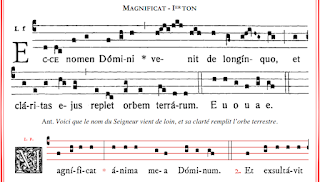Fog. Was watching an episode of Magellan last night and skimming the front pages of the newspapers when the realisation hit almost sensibly that I no longer care which politician has which public office or who is the fashionable artist or popular film-maker or which almost-contemporary quasi-philosopher is the topic of conversation in the faculty lounges. And while I try to keep up with ecclesiastical politics, eh, even in that realm I honestly don't much care: I pray for the prelates who seem to me to be authentic pastors of the faithful and write critical (or sarcastic or ironic) observations about those who seem determined to abuse their confidence and trust but it is the Lord Who will cleanse His Holy Church, not my nonsense typed here, and so prayer and fasting and penitence and alms-giving are what I can realistically do for the good of others. Eh.
This etymological preface to the morning's Golden Legend's notice of Saint Saturninus tickled my funny bone.
Saturnine is said of saturare, that is to be filled, and of nux, that is a nut, for the paynims were filled for to martyr him, like as the squirrel that eateth the nut. For when the squirrel taketh the nut for to have it out of the hull, it seemeth to him bitter, then he goeth up on high on the tree and letteth it fall, and then the hull breaketh and the nut springeth out. And thus were the paynims filled in S. Saturnine, for he was bitter to them because he would not do sacrifice, and then they brought him up on high of the Capitol, and cast him down the steps or grees so that he brake his head, and the brain sprang out of it.
I suspect that, for a few days anyway, I won't watch the squirrels eating peanuts without remembering the martyrdom of Saint Saturninus.
It is one of those days. If one looks at the 1570 and 1910 Calendars, it is the Saturday Commemoratio Sanctae Mariae with a commemoration of Saint Peter of Alexandria, bishop and martyr. Proceeding to the 1939, 1954, 1955, and 1960 Calendars, it is the feast of the Abbot Saint Silvester with commemoration of Saint Peter (although the Ioannes XXIII innovations changed the previous rank of duplex to IIIa classis). And Introibo points out that in certain places the feast of Saint Léonard of Port-Maurice is celebrated. Am going to presume that at Saint-Eugène the Mass will be of Saint Silvester, 13th century founder of the Silvestrine Benedictine family, with the Mass Os iusti. We shall see. My own decision would require the Salve sancta Parens with the two Saints each being commemorated; I do try not to simply invent the day's Office, however, ha, so have used the Divino afflatu, the 1954, Office today.
Have errands to run and will open up the laptop for the recorded Mass when I return. Prime now and then out I go; I don't know if the night's rain has stopped.
Ab ortu enim solis usque ad occásum, magnum est nomen meum in géntibus, et in omni loco sacrificátur: et offértur nómini meo oblátio munda, quia magnum est nomen meum in géntibus, dicit Dóminus exercítuum.
Malachias 1,11, the conclusion of the 3rd lesson at Matins, the final lesson from the Old Testament in the liturgical year soon ending.
Oratio. Infirmitátem nostram réspice, omnípotens Deus: et, quia pondus própria; actiónis gravat, beáti Petri Mártyris tui atque Pontíficis intercéssio gloriósa nos prótegat. Per Dóminum.
Secreta. Quǽsumus, Dómine: ut, dum hæc múnera divínæ majestáti tuæ reverénter offérimus; pia mentis præparatióne et cordis puritáte, beáti Silvéstri Abbátis imitatóres effécti, Corpus et Sánguinem Fílii tui sancte percípere mereámur: Qui tecum vivit et regnat.
Secreta. Hóstias tibi, Dómine, beáti Petri Mártyris tui atque Pontíficis dicátas méritis, benígnus assúme: et ad perpétuum nobis tríbue proveníre subsídium. Per Dóminum.
Postcommunio. Divína dape reféctis tríbue, quǽsumus, Dómine: sancti Silvéstri Abbátis vestígiis ita inhærére; ut copiósam mercédem in regno glóriæ tuæ cum Sanctis habeámus. Per Dóminum.
Postcommunio. Refécti participatióne múneris sacri, quǽsumus, Dómine, Deus noster: ut, cujus exséquimur cultum, intercedénte beáto Petro Mártyre tuo atque Pontífice, sentiámus efféctum. Per Dóminum.
Ant. In illa die stillábunt montes dulcédinem, et colles fluent lac et mel, allelúja.
In that day shall the mountains pour out sweet wine and from the hills shall flow milk and honey, alleluia.
And quite properly the organ is silent, as this season of penitence and preparation begins. The antiphons are beautiful.
The hymn of the Advent season is Conditor alme siderum.
Cónditor alme síderum,
Ætérna lux credéntium,
Christe, Redémptor ómnium,
Exáudi preces súpplicum.
Qui cóndolens intéritu
Mortis períre sǽculum,
Salvásti mundum lánguidum,
Donans reis remédium,
Vergénte mundi véspere,
Uti sponsus de thálamo,
Egréssus honestíssima
Vírginis matris cláusula.
Cujus forti poténtiæ
Genu curvántur ómnia;
Cæléstia, terréstria
Nutu faténtur súbdita.
Te deprecámur, hágie,
Ventúre judex sǽculi,
Consérva nos in témpore
Hostis a telo pérfidi.
Laus, honor, virtus, glória,
Deo Patri, et Fílio,
Sancto simul Paráclito,
In sæculórum sǽcula.
Amen.
Orémus. Excita, quæsumus, Dómine, poténtiam tuam, et veni : † ut ab imminéntibus peccatórum nostrórum perículis, te mereámur protegénte éripi, * te liberánte salvári : Qui vivis et regnas cum Deo Patre in unitáte Spíritus Sancti Deus : per ómnia sæcula sæculórum. R/. Amen.
Arouse Thy might, we beseech Thee, O Lord God, and come: that we may be rescued from the pressing dangers our sins have exposed us to and be saved by Thy liberating power. Who liveth and reigneth with God the Father in the unity of the Holy Ghost God forever and ever, world without end. Amen.
LDVM


Comments
Post a Comment